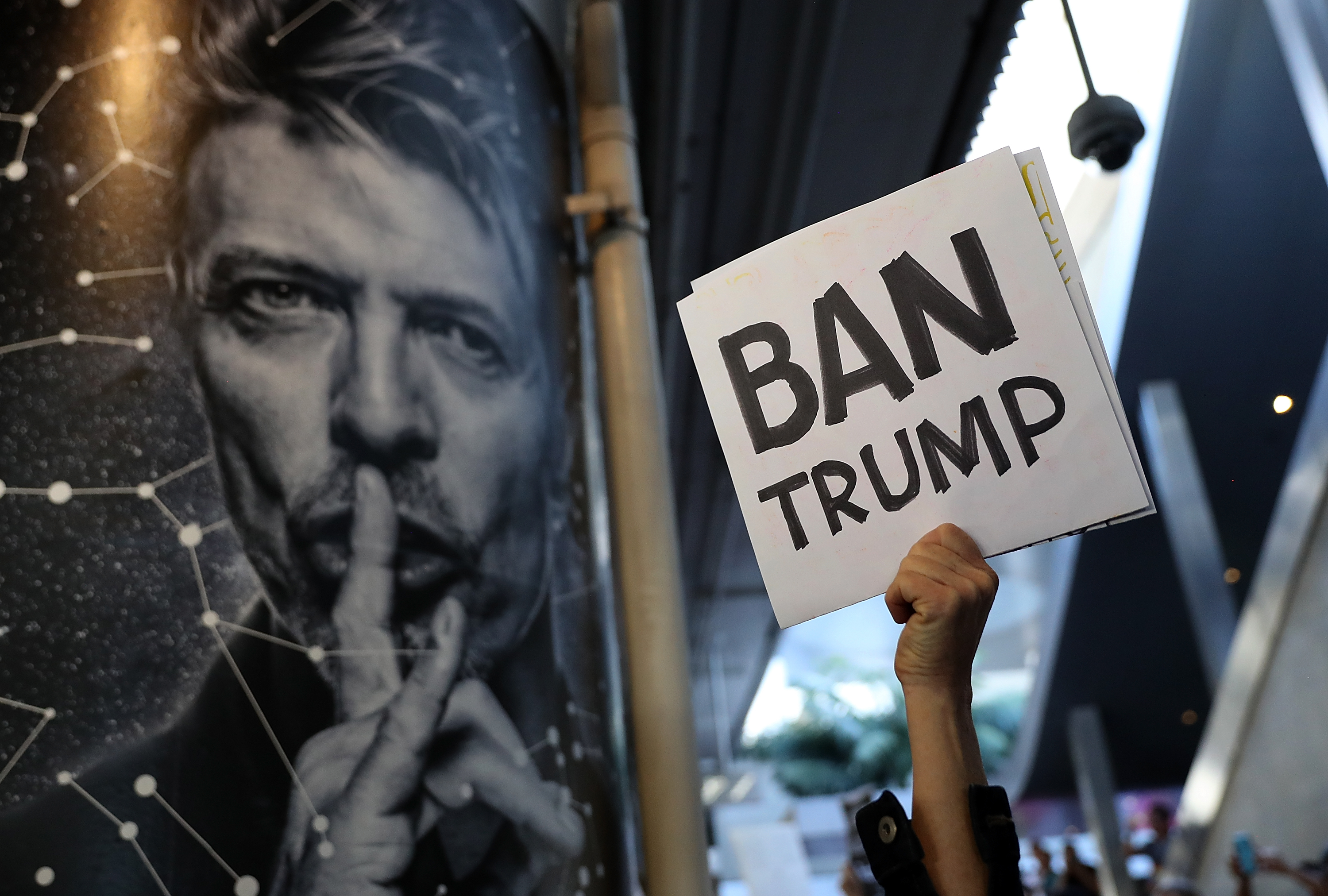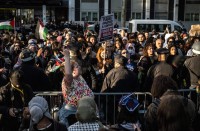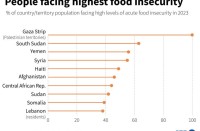
by Jennie MATTHEW / with Karim Lebhour in Washington
WASHINGTON, United States (AFP) — Donald Trump came under fire from mass protests and global outrage over his controversial ban on travelers from seven Muslim countries, facing the first real test of his nine-day administration.
The ban was criticized by allies, sparked confusion over its implementation and galvanized Democrats looking for a lightning rod to beat Trump. There was growing unease among Republican lawmakers as well.
Four federal judges moved to halt deportations, around 300 people were stopped or detained worldwide and US civil rights lawyers warned it could ultimately come down to a battle between the Trump administration and the Supreme Court.
The decree suspends the arrival of all refugees for at least 120 days, Syrian refugees indefinitely and bars citizens from Iran, Iraq, Libya, Somalia, Sudan, Syria and Yemen for 90 days.
Thousands of demonstrators poured onto the streets and gathered at airports for two consecutive days to denounce the executive order as lawyers fought for the release of those detained on arrival — many of them were in mid-air when Trump signed the decree.
Under fire from all quarters, Trump issued an official White House statement to deny it was a Muslim ban and blast the media for its coverage.
“To be clear, this is not a Muslim ban, as the media is falsely reporting. This is not about religion — this is about terror and keeping our country safe,” he said.
The Republican commander-in-chief likened his order to Barack Obama’s six-month ban on Iraqi refugees in 2011.
Obama’s restrictions, also criticized overseas at the time, required visas for people having traveled to the seven countries in the past five years.
Trump then took to Twitter to blast Republican Senators John McCain and Lindsey Graham, members of his own party who criticized the ban, calling them “wrong,” “weak on immigration” and “looking to start World War III.”
Thousands protest
The real estate tycoon, who has never previously held elected office, sees himself making good on a key but highly controversial campaign promise to subject travelers from Muslim-majority countries to “extreme vetting” — which he declared would make America safe from “radical Islamic terrorists.”
“This is something that 75 percent, 80 percent of Americans out there agree with,” White House chief of staff Reince Priebus told NBC television, after rowing back on green card holders by saying they were not affected.
It was unclear how many people remained in detention Sunday. Top Trump aides downplayed the number as “a couple of dozen” as Canada said it would offer temporary residence to those stranded in the country by the ban.
Travelers were detained at US airports, splitting families — such as a father unable to reach his son’s wedding, and a grandmother unable to meet her grandchildren — and officials warned it was a “gift to extremists.”
Six Syrians have turned away from Philadelphia International Airport and sent back to Lebanon, an official at Beirut airport told AFP on Sunday.
But US cities where the electorate overwhelmingly oppose Trump protested.
In New York, police estimated that 10,000 gathered in Battery Park across the river from the Statue of Liberty — America’s famed beacon of freedom and immigration. Several thousand more protested outside the White House.
“Say it out loud, say it clear, refugees are welcome here,” shouted New Yorkers, some holding up signs that reference the Holocaust saying “Never Again.” Trump signed the decree on Holocaust Memorial Day.
“It should send a chill down the spine of every American,” Democratic Mayor Bill de Blasio said as the crowd chanted “impeach” in reference to Trump.
“Taking a whole part of the world and saying you are not welcome here, you are our enemy, that invites violence. That’s not the American way,” said Tal Zlotnitsky, a software technology owner and dual US-Israeli citizen in Washington.
Galvanized Democrats
Hundreds more demonstrated in Boston. Demonstrations were held at Washington’s Dulles Airport and airports in Los Angeles, Orlando, and Sacramento. Activists scheduled other rallies in Atlanta, Denver, Kansas City and Seattle.
While Trump cited September 11, 2001, attacks for his move, none of the 9/11 hijackers’ home countries — Egypt, Lebanon, Saudi Arabia and the United Arab Emirates — were included in the measure. All of those countries are key US allies.
The order affected dual nationals, but not Canadian or US dual passport holders. Britain said its nationals would not be subject to additional checks unless they traveled directly from one of the listed countries.
Trump appeared to justify his order by writing on Twitter that Christians in the Middle East had been “executed in large numbers.”
“We cannot allow this horror to continue!” he tweeted to his nearly 23 million followers, making no mention of Muslims who have been killed in greater numbers.
The ban has galvanized Democratic Party opponents, with lawmakers demanding it is overturned. Sixteen attorneys general from mostly Democrat-run states vowed to fight the order as unconstitutional.
Trump inflamed further disquiet by giving controversial adviser Steve Bannon, a founding member of far-right website Breitbart News, a permanent seat on the National Security Council, apparently at the expense of security chiefs.
The director of national intelligence and chairman of the Joint Chiefs of Staff will instead attend “where issues pertaining to their responsibilities and expertise” are discussed, an executive memorandum read.
Oscar-winning Iranian director Asghar Farhadi and the subjects of “The White Helmets” an Oscar-nominated documentary, announced they would not now attend next month’s Academy Awards.
© 1994-2017 Agence France-Presse






